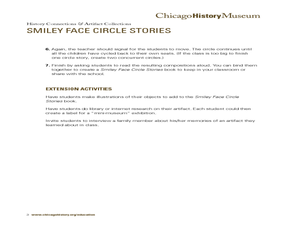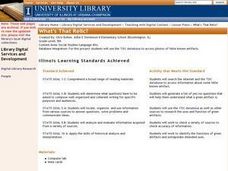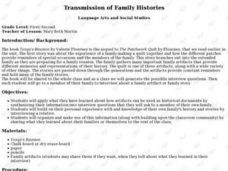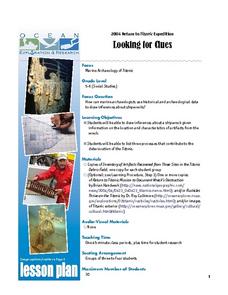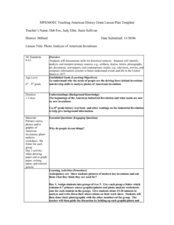Curated OER
BIRDS OF A FEATHER
Learners observe and identify characteristics of artifacts and fossils; explain how artifacts and fossils are used to explore the past; and identify ways that Native Americans prepared food and made tools
Curated OER
Traveler's Trunk
Students analyze and interpret artifacts from the 1920s and explore the Great Migration. In this 1920s history lesson, students review background information about the Great Migration and use artifacts to study history of Chicago....
Curated OER
Smiley Face Circle Stories
Students examine different artifacts from the 1970's. In this history lesson, students discover what each artifact is by seeing the artifact and reading a card defining what the artifact represents. On the second day, students create...
Curated OER
Stampin' Around Chicago
Students discuss the United States Postal Service and choose an artifact from one decade. In this art instructional activity, students research how the artifact chosen relates to Chicago and the United States. Students create their own...
Curated OER
What's That Relic?
Fifth graders listen to a read aloud of David Mc Cauley's book Motel of the Mysteries. They discuss an unknown artifact and decide what it might be used for. They research other artifacts and play "What's that Relic?"
Curated OER
Quilting Our Communities
Students share personal artifacts and use them to make a classroom community quilt.
Curated OER
Transmission of Family Histories
Learners examine how different artifacts represent family history, stories, and experiences. They act as reporters for their own family artifacts sharing them with the class.
Curated OER
What's in the Soil?
Second graders create stratified soil levels using pictures. For this earth science lesson, 2nd graders identify "artifacts" from 3 historic eras and divide them into 3 soil levels. Then they draw their own multi-level soil profile and...
Curated OER
Titanic: Looking for Clues
Students make inferences about a shipwreck based on the location of artifacts. They role play as marine archaeologists and list three processes that contribute to the deterioration of the Titanic.
Curated OER
Photo Analysis of American Inventions
Students interpret historical evidence presented in primary and secondary resources. In this inventions lesson, students analyze photographs of American inventions and and discuss the needs the inventions met...
Curated OER
The Huexotzinco Codex
Learners examine primary sources and perform historical analysis. In this Huexotzinco Codex lesson, students investigate the codex as they make inferences and draw conclusions
Curated OER
Methods of Mystery
Students utilize the scientific method to discover the age of an item. In this historical dating lesson, students compare and contrast a 400 year old cabinet to one made within a few years by using carbon dating. Students complete a...
Curated OER
Protecting the Past: Give a Hoot, Don't Loot!
Students, in small groups, simulate an ancient civilization and the art they created, another group represents vandals, and the final group represents archaeologists who try to figure out what life was like for the "ancient peoples". ...
Curated OER
TechnoKnight
Learners examine world history by creating arts and crafts. In this middle ages lesson, students discuss the relevence of items such as a helmet, shield and family crest. Learners complete middle ages worksheets, create historic...
Curated OER
"Archeology Dig"
Students simulate archaeologists as they dig through a bag with found items in order to arrive at conclusions about the people they are studying.
Curated OER
Roots: The Ancestry of Modern People
High schoolers investigate the models for the origin of modern humans and the conditions that facilitate speciation and evolution. The classification and nomenclature of hominid species is also examined.
Curated OER
Photograph Copying for Primary Source Historical Information (When Skiing Came to America)
Seventh graders explore the history of their town using old photos and interviews to compile data. They used pictures of a historical town event and interview residents who had participated in that event.
Curated OER
Artifacts: Bringing the Past Back to Life -- the Mexican Case
Students examine and discuss the meanings of the various symbols in Tenochtitlan. In groups, they complete a part of the model of the city and discuss the importance of finding artifacts. Individually, they choose an a two-dimensional...
Curated OER
Playing Historical Detective: Great Grandmother's Dress and Other Clues to the Life and Times of Annie Steel
Students draw conclusions about an mystery person based on documents and artifacts provided. In this drawing conclusions lesson, students become detectives by reading and analyzing evidence provided. This lesson includes information on...
Curated OER
Historical Maryland Women
Learners identify objects, activities, and people in pictures of women in Maryland's history. In groups of four, they analyze photo packets of historical women. Students complete an acrostic using phrases reflecting specific...
Curated OER
Using Historical Photographs to Help Students "Live History"
Third graders grasp a deeper understanding of historical time periods when vicariously experienceing the situations and circumstances of real-life individuals and responding to them.
Curated OER
Artifact Exploration
Students develop an understanding of the ways in which different people can use, relate to, and understand an object. Students look at each artifact collected in this lesson plan. For each artifact, the students describe how members of a po
PBS
Interviewing a Parent
Students complete a personal interview in order to discover important information about family history and interesting family artifacts.They analyze statements from the interview in order to prove the accuracy of these statements, as...
PBS
Civil War: Face Jug
Students examine African American art. In this African American history lesson, students research face jugs created by African American freedmen after they watch a video about the artifact and its significance. Students then create...




